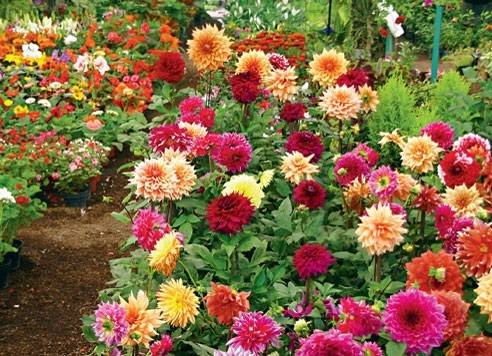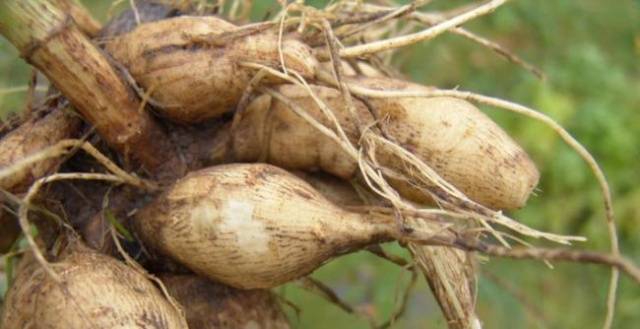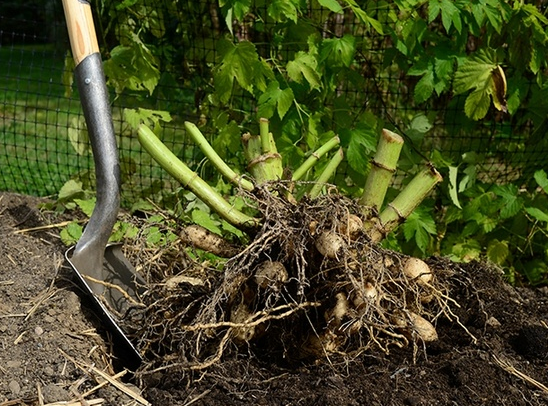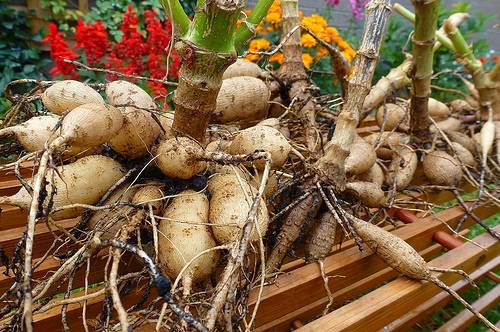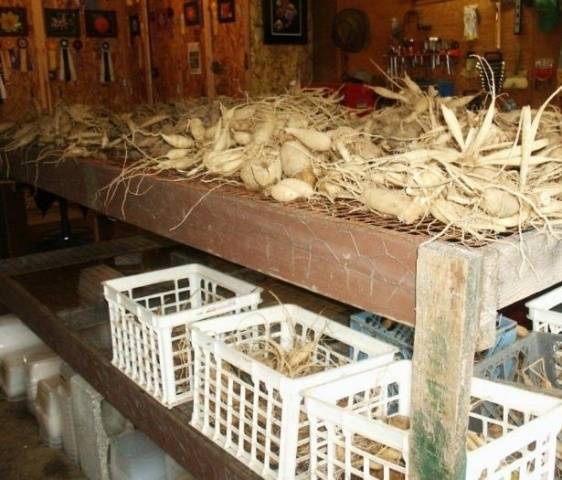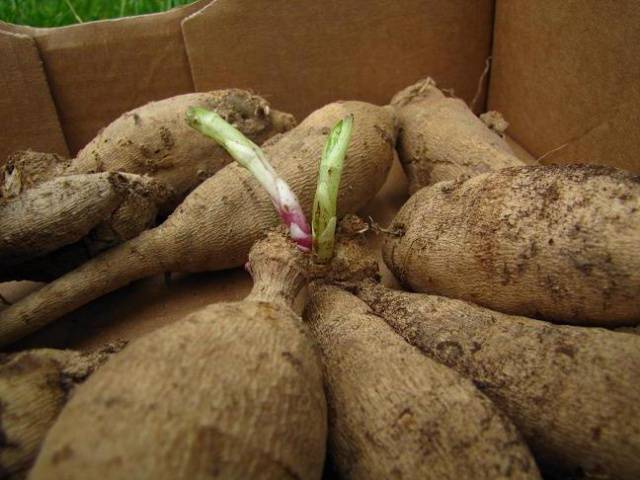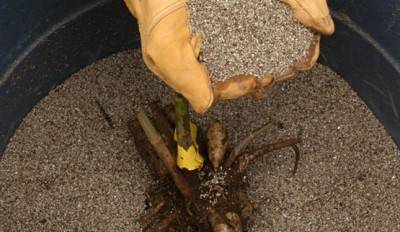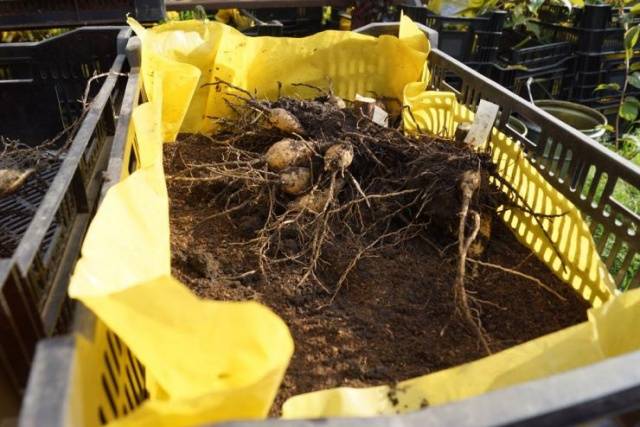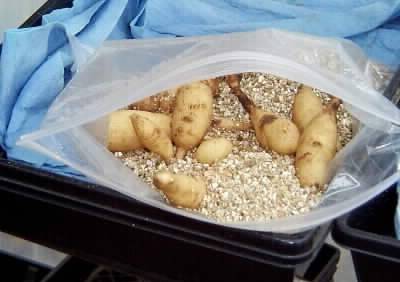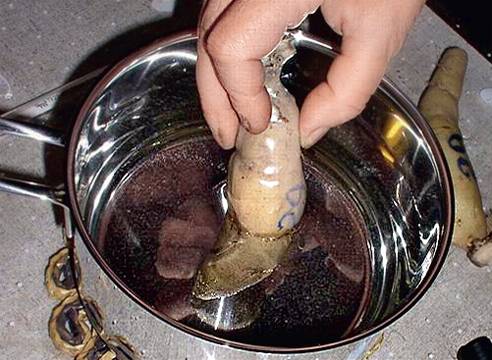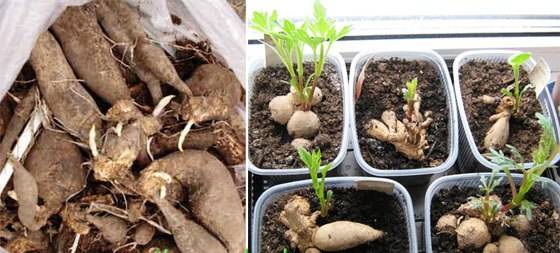Content
Often, the owners of country houses grow dahlias to decorate the site. This genus of flowering plants includes in itself 42 species and over 15,000 different varieties. All the colors of nature can be seen on the buds of these beautiful representatives of the flora. Depending on the variety, dahlias can be annual or perennial. Perennial plants, originally from Mexico, are thermophilic and cannot always successfully survive wintering in domestic climatic conditions. That is why, deciding grow perennial flowers on your site, you need to know how to store dahlias in winterso that with the arrival of the new season they will again delight with their beauty of lush buds.
Features of the root system of dahlias
Dahlias have a rather complex root system. It consists of thickened roots, called storage tubers, and thin roots that supply nutrients to these very tubers. During the period of plant growth, tubers increase in volume, accumulating the necessary nutrients, and during winter storage they retain their viability. Each thickened tuber can live for 3-4 years. At the same time, less saturated tubers and thin roots die during the winter storage period.
The roots of thermophilic dahlias are dug up for the winter and stored in favorable conditions until the onset of spring. However, it is necessary to understand that the bud of the growth of new shoots of the next season is not on the roots themselves, but in the lower part of the shoots of the last year, therefore, when cutting the bush in the fall, it is necessary to leave a small shoot of the stems.
How to prepare tubers for storage
Various varieties of dahlias can delight with the beauty of their flowers in spring, summer or autumn. However, the lush green mass of a plant with the arrival of the first frost always loses its elasticity and aesthetics. The leaves turn black, wilted. It was at this time, without waiting for severe frosts, to dig out the roots of dahlias for subsequent storage.
It is necessary to remove the roots of dahlias from the flower bed when the air temperature is above zero. You should first cut the plant bush, leaving 10-15 cm of shoots. The digging procedure must be carried out very carefully so as not to damage the fragile tubers of dahlias. To do this, first dig in the root neck, then the tubers themselves around the perimeter, at a distance of 20-30 cm from the neck.
In the fall, before storage, the dahlia root is divided. Next year, it will be possible to get a flowering bush from a part that consists of at least one tuber and a shoot with a growth bud. After division the roots of dahlias are examined for damage, putrefactive spots. All suspicious areas on the surface of the tubers must be removed. Also remove the upper part of the left stem until the growth bud and thin roots.
Dahlia roots must be treated with a manganese solution or fungicide ("Maxim", "Fundazol") before storing them. For this, the tubers are washed with clean water and dipped, for example, in a 1% solution of potassium permanganate for 10 minutes. After processing, they are thoroughly dried. The recommended drying temperature is 150C, duration from 2 to 10 hours.
Optimal storage conditions
In order to understand how to properly store dahlias in winter, you need to familiarize yourself with the conditions under which the roots will retain their vitality. So, for storing dahlias in winter, it is necessary to determine a place in which there will be a stable cool temperature within + 3 ... + 70C. The humidity level should not exceed 60-70%. In private houses, such conditions can be created in the cellar, basement. An insulated balcony can be adapted to store dahlia tubers in an apartment.
For the safety of dahlia tubers during winter storage, they are placed in bags, boxes or other containers. Additionally, the tubers are sprinkled with non-hygroscopic material, for example, sand. The most commonly used storage methods for dahlia roots are detailed below.
Storage methods
Storage dahlias after digging is not a troublesome business if the preparation of the tubers has been correctly carried out. Dry roots, disinfected with an antiseptic agent, are well stored in conditions with low temperature and humidity. Fluctuations in temperature can cause premature bud germination, which will lead to the death or deterioration of the quality of the planting material. It is also important to remember that only ripe tubers can be stored for storage. If you dig up the roots before the arrival of frost, then their keeping quality will be low.
In private homes, it is easy to find a place to store dahlias. As a rule, you can find a secluded corner in the cellar with the required temperature and humidity. In this case, the roots can simply be put in a cardboard or wooden container, and with the arrival of spring, get the container out of the cellar and plant the roots in the ground. If there are no such conditions, then it is necessary to take care of the presence of a filler in the containers, which will protect the tubers from low temperatures and fluctuations in humidity. You can find out about using the most affordable methods for storing roots below.
In sand
Many country house owners prefer to store dahlia bulbs in the sand. This material does not absorb moisture or deplete tubers. For storing tubers, containers are filled with sand. It can be plastic or wooden boxes, buckets with a volume of 20 liters. Dahlia tubers are placed in the sand in one or more rows. The storage container is covered with burlap and lowered into the cellar or basement. In an apartment, it can be placed in a cold corridor or, for example, at a balcony door.
During storage, you can periodically check the condition of the roots. In this case, in no case should the sand be moistened, as this can lead to decay of the roots. The peculiarity of this storage method is the early awakening of the tubers. To prevent premature germination, it is necessary to reduce the storage temperature strictly to +30FROM.
In peat
Peat can also be used for winter storage of dahlia tubers. To do this, sprinkle a layer of peat on the bottom of the box and spread the roots of dahlias on it. Another layer of peat is scattered over the tubers. Such boxes can only be stored in a cellar or basement, where there is no access to light and sudden temperature fluctuations.
In sawdust
You can save dahlia tubers until spring in sawdust... The only requirement for such a filler is the size of the segments. It is better to use coniferous wood chips for storage. It will not absorb moisture from the environment and the roots themselves. Pour sawdust into a wooden or plastic container with air access. The use of sealed plastic bags to preserve the roots is not at all permissible, since the lack of ventilation will lead to their rotting.
In paraffin
For some residents of apartment buildings, the issue of storing dahlias in room conditions is especially acute. For them, there is the most laborious, but effective way of storing dahlia roots, in which they use paraffin.
The main advantage of paraffin is its tightness. It prevents the roots from absorbing moisture and evaporating it.As a result of using such material, the tubers do not dry out and do not rot. Pathogenic fungi, bacteria and viruses do not develop under the paraffin layer.
You can "pack" dahlia tubers in paraffin as follows:
- Candles or paraffin are ground into shavings (you can grate on a coarse grater) and then poured into a container, at the bottom of which there is a little water.
- The container with paraffin is placed in a water bath for melting. The result should be a layer of viscous liquid of 2-5 cm.
- It is necessary to immerse the roots in paraffin for just a few seconds. Taking them out of the container, you can see a paraffin film that will protect the tubers from external factors during winter storage.
Tubers in paraffin can be placed in boxes, buckets or bags, wrapped in foil. The peculiarity of this storage method is the premature germination of tubers. Therefore, it is recommended to use the method for early varieties.
An example of how to preserve dahlias in winter using paraffin is well described in the video:
Vermiculite for storing tubers
Vermiculite is a natural material that is not hygroscopic and can replace paraffin in its properties. For storing dahlia tubers, it is recommended to use coarse vermiculite. You can find it in the agricultural store. A layer of vermiculite is poured into an airtight container and tubers are laid on top of it, sprinkling with another layer on top. So, fill the entire container and close it with a film or a sealed lid.
Conclusion
Regardless of the filler, containers with roots should be placed in a cool, dark place with the recommended humidity level. Otherwise, the roots will dry out or, conversely, germinate prematurely. If in a private house the storage issue can be solved quite simply by placing containers in a cellar, basement or, in extreme cases, in a cold corridor, then in an apartment it can become a real problem. Of course, the boxes can be installed on the balcony, but at the same time there will always be the likelihood of their freezing. To prevent freezing, containers are brought into the room, placed at the balcony or front door (in the coolest place). Such temperature fluctuations will affect the quality of the roots. A paraffin sheath and a thermal insulation shelter can smooth out the negative effect. In an extreme case, storing dahlias in an apartment can be carried out in a refrigerator, however, it is unlikely that a large number of tubers can be put in the refrigerator.
